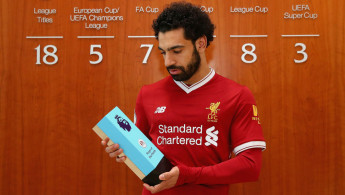Saudi Arabia 'to reward Mo Salah with land in Mecca'
The Vice-President of Mecca's municipal council Fahd al-Ruqi revealed on Monday the city's intention to give Salah a piece of land in the Mecca region as a reward for scoring a whopping 43 goals during his first season for Liverpool FC, as well as scooping the English Premiership Players' Player of the Year award, in doing so becoming the first Egyptian ever to win the prestigious prize.
Al-Ruqi said that several ways to gift the land were being considered.
"There are several choices regarding giving this piece of land, and will be determined by Mohammed Salah as well as the Saudi authorities. If the Saudi authorities allow the land to be owned by Salah, he will be given a piece of land in holy Mecca outside the Haram [The Great Mosque]. The other option will be to have a mosque built on the land in his name."
The third option, al-Ruqi said, was to sell the land and give Salah the money, if he so desired.
Twitter Post
|
Al-Ruqi added that the decision to award Salah the land was to show the charitable footballer support and in doing so encourage young people with potential.
Al-Ruqi emphasised that the gift was, "nothing but appreciation for the Egyptian star and his admirable morals and model values", calling 25-year-old Salah "Abu Mecca", and adding that Salah is "a wonderful representative of Islam in Britain".
Chants honouring Salah, who Liverpool fans have nicknamed the "Egyptian King", have gone viral for their praise of Islam.
"Mo Sa-la-la-la-lah, Mo Sa-la-la-la-lah, if he's good enough for you, he's good enough for me, if he scores another few, then I'll be Muslim too," fans have been filmed singing in stadiums.
"He's sitting in the mosque, that's where I want to be," the chant continues.
A new report claims that the success of the fast-becoming Liverpool legend has "significantly decreased" hate and race crimes in the English Premier League.
"Winning makes everybody feel good. Salah is playing very well, which excites fans, making them more apt to accept his ethnic and religious background when they may have not before," said Piara Powar, executive director of Football Against Racism in Europe (Fare) who authored the report, told The Washington Post.
"Good players break down barriers. We know that an appreciation of someone as a player does lead to a look into their identity and, for many fans, an acceptance of their identity."





 Follow the Middle East's top stories in English at The New Arab on Google News
Follow the Middle East's top stories in English at The New Arab on Google News
![The UAE is widely suspected of arming the RSF militia [Getty]](/sites/default/files/styles/image_330x185/public/2024-11/GettyImages-472529908.jpg?h=69f2b9d0&itok=Yauw3YTG)
![Netanyahu furiously denounced the ICC [Getty]](/sites/default/files/styles/image_330x185/public/2024-11/GettyImages-2169352575.jpg?h=199d8c1f&itok=-vRiruf5)
![Both Hamas and the Palestinian Authority welcomed the ICC arrest warrants [Getty]](/sites/default/files/styles/image_330x185/public/2024-11/GettyImages-2178351173.jpg?h=199d8c1f&itok=TV858iVg)